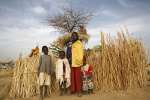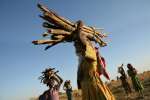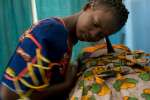UNHCR welcomes Council of Europe convention on combatting violence against women
News Stories, 1 August 2014
STRASBOURG, France, August 1 (UNHCR) – The UN refugee agency has warmly welcomed the entry into force of a Council of Europe convention aimed at preventing and countering violence against women and domestic violence.
The Istanbul Convention, which came into force on Friday, requires state parties to ensure that gender-based violence against women may be recognized as a form of persecution and to ensure that the grounds for asylum listed in the 1951 Refugee Convention are interpreted in a gender-sensitive manner. This is the first time that gender-related persecution is explicitly mentioned in an international convention.
"The Istanbul Convention is designed to become a global protection tool because non-European states can also accede to the convention," said Gert Westerveen, UNHCR's representative to the Council of Europe. "All states should accede to it and implement it," he added.
The convention requires state parties to adopt legislative and practical measures to prevent and combat violence against women, as well as to coordinate measures through comprehensive policies. It establishes an obligation to introduce gender-sensitive procedures, guidelines and support services in the asylum process.
Some states, when applying the 1951 Refugee Convention, fail to acknowledge a gender-sensitive dimension, which may result in inconsistent asylum decisions and deprive many women and girls of international protection.
The Istanbul Convention also reiterates the obligation to respect the principle of non-refoulement requiring that countries adopt measures to ensure that female survivors of violence are not returned to any country where their lives would be at risk or where they may be subjected to torture or inhuman or degrading treatment or punishment.
Sexual- and gender-based violence (SGBV) affects mostly women and girls, and the forcibly displaced are especially at risk. Many of their asylum claims involve fear of gender-based persecution, including trafficking for sexual and labour exploitation, forced marriage, forced sterilization, female genital mutilation, the threat of "honour" crimes, sexual violence and rape.
In June, UNHCR Special Envoy Angelina Jolie co-chaired a global summit in London, United Kingdom, on ending sexual violence in conflict, helping to put a spotlight on the issue and galvanize public support. Last year, some 12,000 SGBV incidents were reported to UNHCR in 43 countries. One can assume much higher numbers given the many obstacles faced by survivors in reporting their ordeal.
By Jutta Seidel and Gert Westerveen in Strasbourg, France






































